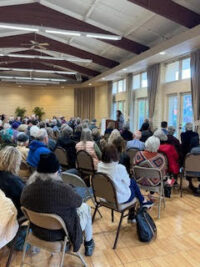Sonoma’s Planning Commission, the seven-member, City Council-appointed body that reviews and approves development applications, recently completed its recommendations for housing on new Commercial and Mixed-use zoned projects in the City of Sonoma.
The result removes subjective language from the zoning code, and will likely put more money into the city’s Affordable Housing Trust Fund. Planning Commission members unanimously agreed that creating housing – particularly other than expensive, market-rate, single-family homes – is a priority.
A requirement of state law now mandates that land-use and development decisions be made on the basis of objective, quantitative standards only, meaning subjective criteria like “compatibility,” or “community character,” and guideline language such as “should” cannot be used as the basis of approvals or denials of applications. Accordingly, the use of “should” in Sonoma’s Development Code is being reviewed, and as appropriate, changed to “shall.”
For development on Commercially-zoned parcels, existing code language states that on parcels larger than one-half acre, housing “should” be included and normally comprise 50% of the project, unless waived by the Planning Commission. Accordingly, the commission’s task, in cooperation with the city’s planning staff and land-use attorney, was to review the Development Code, remove the subjective language and determine objective standards.
The same evaluation process was applied to regulations for Mixed-use projects, a zoning designation intended to create projects that include both housing and commercial components. Sonoma’s Mixed-use zone includes most of Broadway from the Plaza to Leveroni Road.
After an in-depth discussion of more than an hour-and-a-half, the commission decided that for development projects on Commercially-zoned parcels over one-half acre, housing shall be required, and that it must comprise 50% of the total project’s built area.
The option for a housing waiver was replaced with a contribution to the city’s Affordable Housing Trust Fund, made in an amount equal to the cost of construction. In other words, developers must build housing on larger commercial projects – or pay into the city’s housing fund.
A review of projects in the Mixed-use zone revealed that past projects have rarely included both housing and commercial components but rather, either one or the other. The reason for this is largely financial; lenders do not make loans on such blended projects unless the commercial component is 20% or less of the total project area.
Given that reality, and both the need for new housing and the intention of the city’s General Plan, the commission recommended that Mixed-use zoned projects include no less than 80% housing, that no waiver of the housing requirement be allowed, and that no requirement for a commercial component be included.
The commission’s unanimous recommendations must now be approved by the City Council.








Be First to Comment